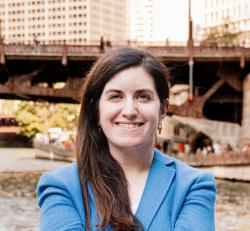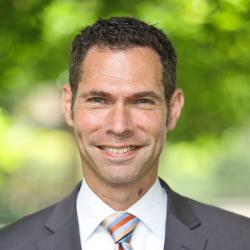A new foreign resident in St. Louis with a specialty in accounting is connected with peers in the local industry. Immigrant entrepreneurs spanning high-tech industries and neighborhood businesses get resources to launch and scale. Mentoring and support groups help over 300 international spouses feel at home in the region.
These services are all part of the Mosaic Project, a seven year-old initiative of the St. Louis World Trade Center, aimed at ensuring that the region is equipped to fully leverage the potential of foreign talent and immigrants from around the world to fuel local jobs and growth. The effort is a building block of a broader regional strategy led by the World Trade Center (which is housed within the St. Louis Economic Partnership) to ensure St. Louis’s overall global competitiveness.
With multinational corporations like Bayer and major research universities drawing students from around the world, St. Louis isn’t lacking global connections. But as technological change and globalization concentrate economic success in fewer, larger, and oftentimes coastal places, mid-sized and central regions need to take deliberate action to ensure their global competitiveness. This includes ensuring that a region is open and welcoming to attract foreign talent and business who contribute new skills, connections, expertise, and population to cities–all at a time of increasingly challenging national policy and rhetoric.
The Mosaic Project was initially sparked by a concern that, relative to peer cities, St. Louis had a lower share of the skilled foreign talent that can fuel innovation and make a region attractive to global firms. It has since evolved into a multi-pronged effort aimed at engaging and supporting foreign students, workers, and entrepreneurs. These programs and strategies address specific gaps identified in connecting talent to workforce opportunities and entrepreneurship resources, as well as more broadly marketing and telling the story of St. Louis as a welcoming beachhead for foreign and immigrant talent.
These programs and strategies address specific gaps identified in connecting talent to workforce opportunities and entrepreneurship resources, as well as more broadly marketing and telling the story of St. Louis as a welcoming beachhead for foreign and immigrant talent.
“You have to create a welcoming tonality of your local community at the same time that you have to be attracting international people,” said Betsy Cohen, the project’s executive director and a former Nestle Purina executive, “The soil has to be receptive to the seed. If you bring the seed and the soil isn’t receptive, it won’t thrive.”
To support this connectivity, Cohen marshals an “orchestra” of high-level local business executives, government representatives, university provosts, the regional chamber of commerce, tourism entities, representatives from local immigrant communities, the International Institute of St. Louis, and more, who serve on the project’s steering committee. These leaders can offer specific resources or direct action related to foreign student applications, launching employee resource groups, or making connections between disparate efforts. Rather than a stand-alone initiative, the project is also housed within the region’s World Trade Center, ensuring that it’s aligned with broader economic development strategy.
St. Louis isn’t the only region recognizing the connection between a welcoming environment and global business success.
In Louisville, local leaders have made welcoming immigrants, refugees, and foreign talent a strategic priority for economic and population growth. A Global Louisville collaboration between Louisville government and the region’s chamber of commerce focuses on career ladder services, small business development, enhancing cultural competency within local businesses, and ensuring that regional tourism promotion reflects a diverse identity.
“It’s not just about helping companies understand global business,” said Bryan Warren, director of Louisville Metro Government’s Office of Globalization, “Communities that are embracing global fluency are going to be more competitive.”
In 2017, the Charleston Regional Development Alliance launched a global fluency strategy, after realizing, through the Global Cities Initiative, that the region needed to bolster an environment that is conducive to attracting and retaining foreign talent, despite the presence of big multinational firms like Mercedes-Benz, Volvo, and Safran, alongside a growing global tourism brand.
That strategy, which is supported by a committee of community volunteers, focuses on both the integration of new foreign residents and outreach to Charlestonians on the benefits foreign investment and cultures provide. An online resource guide, direct engagement to foreign residents, and expanded international signage at the region’s airport make it easier for new residents to find schools, access cultural organizations, feel welcome, and connect to the community. CRDA also releases an annual “global connectivity snapshot” that provides a concise distillation of the significance of global engagement to the region’s prosperity.
The Columbus Council on World Affairs also offers “global fluency” training to executives from large regional firms as well as local students, equipping the region’s current and future workforce with the skills to engage with international counterparts.
As a larger share of economic activity takes place outside U.S. borders and global innovation, talent, and connections drive competitiveness, global engagement is an increasing imperative for U.S. cities and regions. In some cases, that means helping firms better understand foreign customs duties, complex analysis of foreign markets, or expensive investments in economic specializations or infrastructure. But leaders shouldn’t discount a seemingly more basic element of succeeding as a global city: ensuring that foreign talent feels welcome and understands that the region is open for business.
The Brookings Institution is committed to quality, independence, and impact.
We are supported by a diverse array of funders. In line with our values and policies, each Brookings publication represents the sole views of its author(s).









Commentary
Welcoming communities make for globally competitive city-regions
August 5, 2019